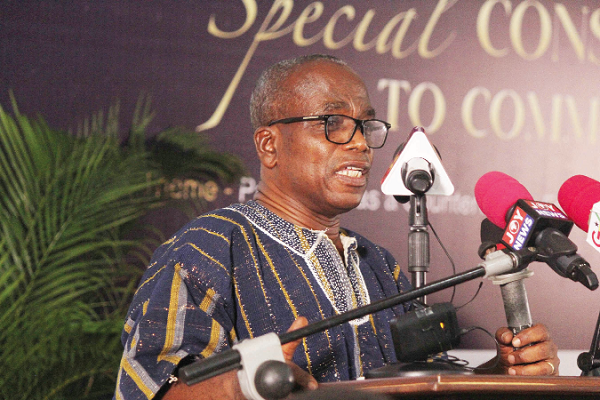
Use your powers to check Executive - NMC chair challenges Parliament
The Chairman of the National Media Commission (NMC), Yaw Boadu-Ayeboafoh, has urged Parliament to exert its powers to check the Executive arm of government.
He said arguments that the Constitution had given many sweeping powers to the President could not be the case because Parliament equally had wide powers that enabled it to serve as an effective check on the other arms of government.
Advertisement
Speaking at a colloquium last Tuesday on the role of Parliament, Mr Boadu-Ayeboafoh said even if the powers of the President were whittled down through a constitutional amendment, the President would still be powerful if Parliament failed to effectively perform its functions.
He said Members of Parliament (MPs) must realise that they were a check on the Executive and had a duty to serve in the interest of the nation, without toeing partisan lines.
The NMC Chairman, speaking with the Daily Graphic after the colloquium, said: “We could even have a less powerful President but that President would still be powerful if MPs failed to assert themselves.”
“If MPs are not willing to serve their constituents and the public interest and rather think they serve the President, no matter how much power is taken from the President, he will still be powerful,” Mr Boadu-Ayeboafoh said.
The colloquium, part of activities to mark the 20th anniversary of the 2002 Class of the Ghana School of Law (GSL), was moderated by Mr Boadu-Ayeboafoh, himself a member of the 2002 Class of the GSL.
It was on the theme: “Parliament as a Countervailing Force for Effective Governance in Ghana: Challenges, Prospects and Recommendations”.
Other speakers were the Majority Leader in Parliament, Osei Kyei-Mensah-Bonsu; the Minority Leader, Haruna Iddrisu; a Deputy Attorney-General, Alfred Tuah-Yeboah, and the Director of the GSL, Yaw Oppong.
Constitutional review
Mr Boadu-Ayeboafoh said although there was the need to review the Constitution, it must be noted that the President could become too powerful only with the support of Parliament.
For instance, he said, if the President appointed a minister who was not fit for the job and Parliament failed to scrutinise it but went ahead to approve him/her, then Parliament would have aided the Executive to be excessive.
The NMC Chairman said certain ministerial approvals by Parliament betrayed how the legislative body was influenced by factors other than approving nominees on their competency.
“There is no way the President or the Executive arm of government will abuse its power or become too powerful without the tacit support of Parliament,” he said.
Making a case for a review of the Constitution to reduce the powers of the President, Mr Iddrisu said the appointing powers granted the President had made him too powerful, to the extent that it had weakened critical institutions such as Parliament.
According to him, MPs, especially those seeking ministerial appointments, were at the mercy of the President and would, therefore, do anything to please him.
He also wondered why the President should be made to appoint heads of state-owned enterprises, such as Ghana Railway Company and the Ghana Cocoa Board (COCOBOD), describing it as not being a presidential function.
For the Majority Leader, the Constitution needed to be reviewed to make Parliament more effective and efficient.
He said, for instance, that the Constitution should be amended to make the Speaker of Parliament an MP and not an outsider.
Enough checks
Mr Oppong, who submitted that there was no need to reduce the powers of the President, contended that there were enough checks and balances to ensure that the President did not become too excessive.
For instance, he said, articles 2(1) and 130 of the Constitution had given the Judiciary the power to ensure that the President acted within the confines of the law.
“The Supreme Court can strike down any or every act or omission of the Executive if it is inconsistent with any provision of the Constitution,” he said.
Mr Tuah-Yeboah said Parliament was equally powerful, if not more than the Executive, as it had the power to remove the President and censure ministers, for which reason any failure on the part of Parliament should be placed at the doorstep of the legislative body.
“No one is denying Parliament the power to check the Executive, but perhaps it has failed to do so from its own doing,” he said.




